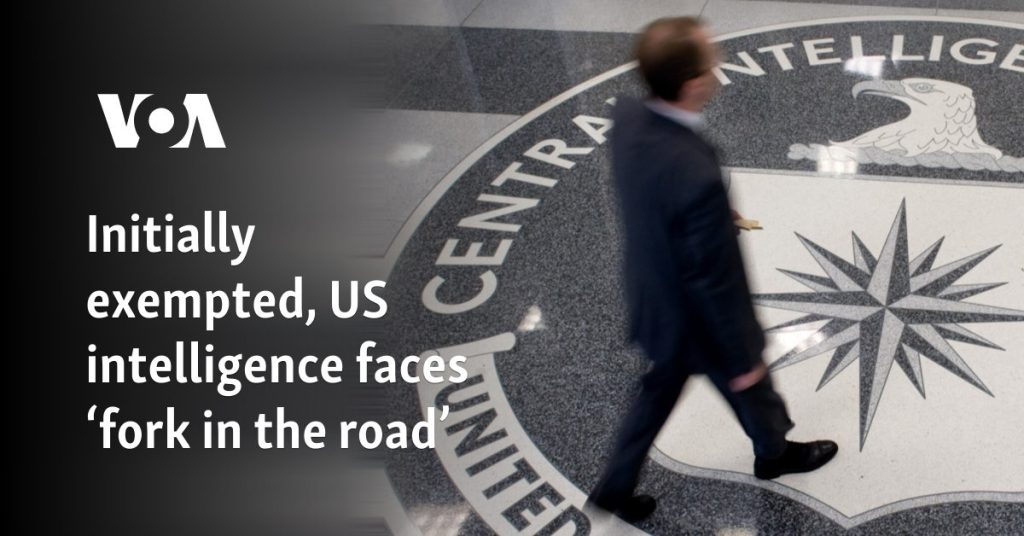
A handful of key U.S. intelligence agencies have given most of their employees a chance to walk away, offering them the opportunity to take the deferred resignation option extended to the government’s civilian workforce.
Under the initial rollout of the plan, aimed at drastically reducing the size of the U.S. government, military and security employees were exempt, due to the critical nature of their work in protecting the United States.
But over the past few days, at least five U.S. intelligence agencies have come forward, telling their workforces that they can choose to take the so-called “fork in the road” deal, allowing them to get paid until September while no longer working on a daily basis.
The list includes the CIA, the country’s premiere spy agency, and the Office of the Director of National Intelligence, which is charged with overseeing all 18 U.S. intelligence agencies.
The National Security Agency, which specializes in electronic intelligence gathering, the National Geospatial-Intelligence Agency and the National Reconnaissance Office also confirmed to VOA their participation in the downsizing program.
A CIA spokesperson, speaking on the condition of anonymity in order to discuss the initiative, said it was triggered by the agency’s newly confirmed director, John Ratcliffe, to be more responsive to President Donald Trump’s priorities.
“These moves are part of a holistic strategy to infuse the Agency with renewed energy, provide opportunities for rising leaders to emerge, and better position the CIA to deliver on its mission,” the spokesperson said in a statement.
The other intelligence agencies taking part in the deferred resignation program declined to explain why workers initially seen as critical to U.S. national security are now deemed as expendable. Nor did they answer questions about the impact potential resignations could have on their missions.
The White House National Security Council referred questions about the decision to make the intelligence agencies eligible for the program and the potential impact to the U.S. Office of Management and Budget. OMB has yet to respond to multiple requests for comment.
The move, though, has raised concern among some former intelligence officers and experts who fear the potential reductions could hamper the ability of U.S. intelligence agencies to gain information and insights that are vital to the security of the U.S. homeland.
Daniel Byman, director of the Warfare, Irregular Threats, and Terrorism Program at the Washington-based Center for Strategic and International Studies, said the impact on the CIA could be significant.
“If many employees take the option, it risks reducing the tremendous expertise the CIA has built up on a variety of areas,” he told VOA.
“It takes years to develop the operational and analytic expertise to be a good intelligence officer, and losing this would be a significant blow to U.S. capabilities during a turbulent time in the world,” Byman said, noting that proposed job cuts at the FBI could boost U.S. adversaries that “try to exploit U.S. security vulnerabilities and influence U.S. public discourse.”
Senior Democratic lawmakers such as Senate Intelligence Committee Vice Chairman Mark Warner have likewise raised concerns — noting even Trump’s hiring freeze exempted national security jobs.
Others describe the push to get U.S. intelligence officials to quit as “crazy.”
“I think that’s a great way to send some of our best talent packing,” said Representative Raja Krishnamoorthi, the ranking member of the House Select Committee on the Chinese Communist Party.
“It’s a way to help our adversaries,” Krishnamoorthi told VOA. “I hope that they reconsider this nutty HR [human resources] move and instead try to attract the best and brightest in the intelligence community because we need them.”
But Republican Senator Thom Tillis called such fears “overblown.”
“Really, if people think that special operators and clandestine operators are suddenly going to take it, they don’t understand what’s trying to be happening here,” he told VOA. “What they’re trying to do is probably get less out of the head office and less out of administrative positions, so they can put more into the field.”
“The press is going for the worst-case scenario,” Tillis added. “Most of these people are at the end of their career anyway, and so you’re doing buyouts so that you can bring in new people and right-size.”
Other former officials see an upside to the inclusion of U.S. intelligence agencies in the deferred resignation program, casting it as a clear message to U.S. adversaries to beware.
“What this says to a country like Russia or China or others, [is] Trump is a very strong leader,” said former U.S. Ambassador to NATO Kurt Volker.
“This is something that they did not see with President [Joe] Biden, who is a weak leader in their eyes,” Volker told VOA. “In Trump, they see someone who is willing to go there. He is willing to break crockery. He’s willing to escalate. He’s willing to do what he wants in order to get his will accomplished. That sends a very strong message to adversaries.”
The deferred resignation program’s numerical impact on U.S. intelligence agencies remains unclear.
U.S. officials say that so far, 65,000 of the government’s approximately 2 million employees have chosen to accept the offer, although the number of intelligence agency employees is classified. The individual agencies are unlikely to release data.
The original deadline for government employees — including at the intelligence agencies — to accept the deferred resignation offer was Thursday, but a court order has delayed that until at least Monday.








